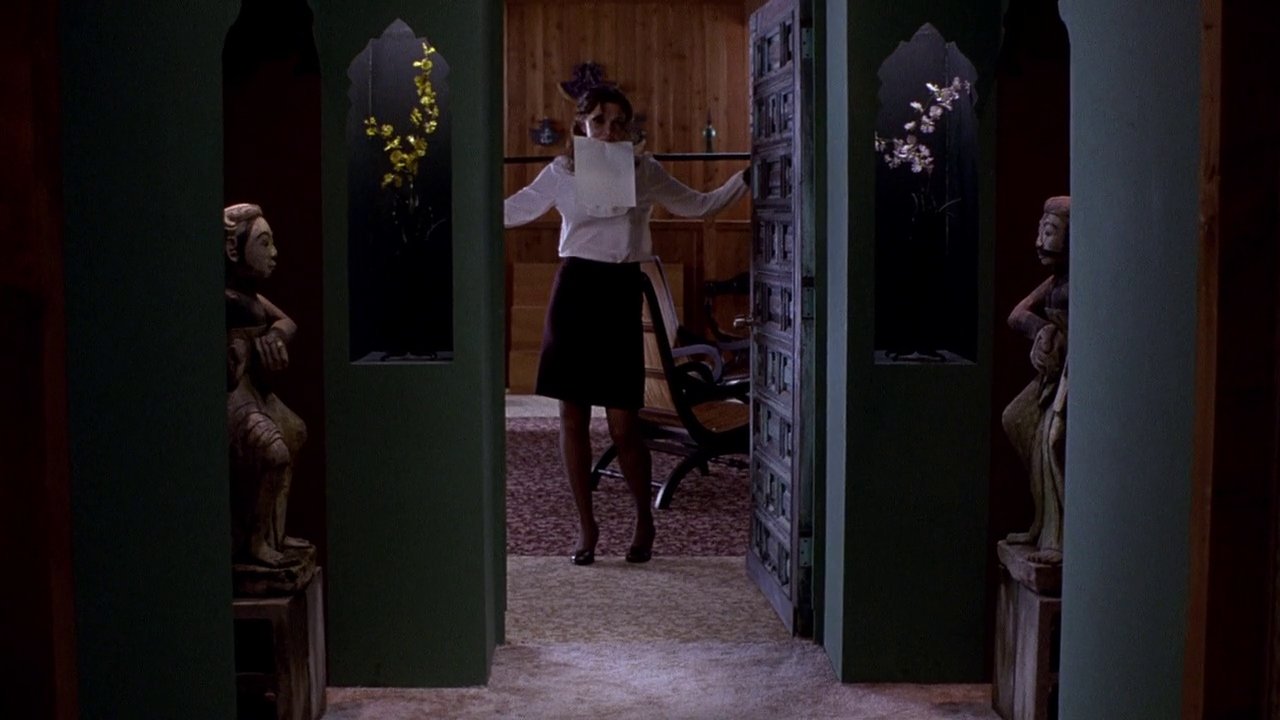Secretary (2002) in 2025
Secretary, a 2002 drama directed by Steven Shainberg, functions to surpass the inflexible mindset of the media and its presentation of women in the early 2000s. The film fulfills the role of a cultural and artistic pioneer in office wear fashion, and in empowering women sexually.
Movie still from Secretary (2002) via Film Grab © All rights belong to their respective owners. No copyright infringement intended.
Movie spoilers ahead. Read at your own risk.
If you’re looking to watch a digestible and prototypical film about a woman’s rise to power, I suggest you look elsewhere. Secretary isn’t your typical Devil Wears Prada-esque, feminist-who-climbs-to-the-top movie. I’d like to make the claim that although it isn’t those things, it might just be better.
Secretary leans both into and out of its era of release and sociocultural context; the film veers away from the classic Y2K trends of chunky shoes, low-rise pants, and visible whale tails, and leans more into evoking sensuality through coverage. On a more political note, the movie further transgresses the realities of third-wave feminism through the sexuality of its main character, a mentally troubled woman named Lee.
As for its contributions to everyday styling, Secretary elicited a fashion trend which worked opposite to "less as more," and rather towards "more as better." We know trends to fluctuate, to move across a pendulum between ‘in style’ or not. The certainty of these trends lies in their nature of being spotlighted, rendered ‘old news,’ and their return to acclaim. Observable as the stereotypical, shy, young woman in the film, Lee’s style in her office job was nothing less than catalytic for the future of workwear fashion.
Upon her release from a mental institution, Lee takes a job as the secretary to a nearby lawyer. Despite being exclusively styled in sober, modest clothing, Lee’s capacity for sexual expression is boundless. As the film progresses, Lee’s sexuality is explored more and more throughout her choice in garments, which have high coverage. Lee is typically clothed in a long-sleeved, button-up blouse, and a skirt that surpasses her knees. Deviating from the common reception of chaste outfit choices, Lee summons sensuality in her workwear. She underscores an eroticism that exists in tandem to covering up – a desire to uncover a mystery beneath the surface, and the notion that more exists than meets the eye.
Movie still from Secretary (2002) via Film Grab © All rights belong to their respective owners. No copyright infringement intended.
Following the release of the movie, there has been a rise in contributors to this "more as better" workwear movement. A mere decade after Secretary reached the theaters, the inception of brands such as The Frankie Shop and Le 17 Septembre hit the market to follow suit of the film. Both brands foreground professional attire, accentuating the power in an amorphous silhouette and bashfulness in style.
Apart from its strides in the fashion realm, Secretary further assumed the role of a political innuendo after its release. In an age when a focus on policy towards women’s agency was accented, Lee’s sexual relationship with her superior functioned as a stepping stool concerning this autonomy.
Lee and her boss, Mr. Grey, share both a curiosity and appreciation for sadomasochistic tendencies in their romantic relations. While this relationship reveals an inceptive disparity in power, the film quickly shifts the narrative. Lee is an active participant in this sexual dynamic, and even gains a better understanding of herself and her wants throughout her ‘firsts’ with Mr. Grey.
Movie still from Secretary (2002) via Mubi © All rights belong to their respective owners. No copyright infringement intended.
Further in the film, Lee obtains an even greater sense of agency by which she is actively putting her needs to the forefront of her sex life, being proactive rather than passive. By the end of the film, it is Lee who is insistent on her desire for a rather deviant sex life. She protests by putting her hands on Mr. Grey's desk, not moving or eating for a week, in order to establish the relationship as being on favorable terms for herself. This veers away from the typical interpretation of women’s place in sex in the early 2000s. Rather than submitting for the pleasure of the man in her life, Lee is in control and stipulates that these conditions are what please her, and what she demands.



